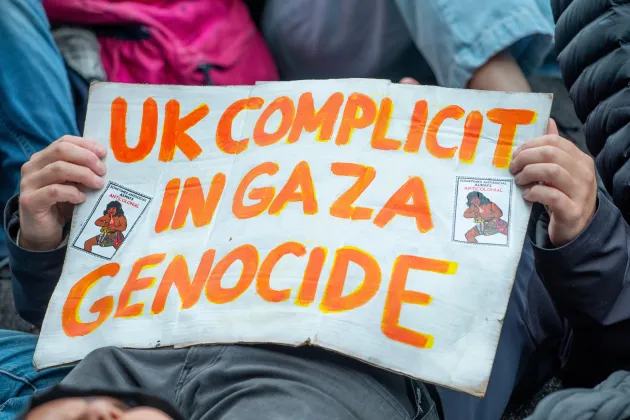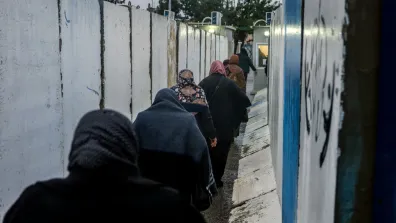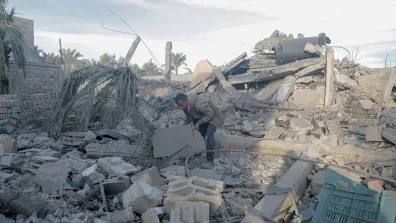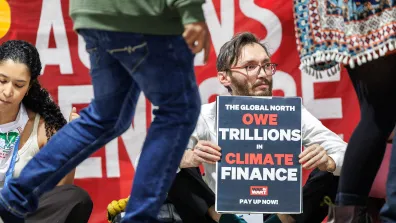Israeli apartheid factsheet
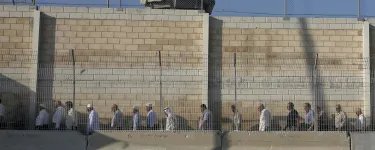
A long-term solution to the crisis facing the Palestinian people is only possible through a proper understanding of the situation that has developed over the past century, and through the proper use of words to describe that situation correctly. Apartheid is one of those words.
What is apartheid?
Apartheid is the Afrikaans word for ‘apartness’, originally used to describe the system of racial discrimination that existed in South Africa until 1994.
The term apartheid is not only a reference to South Africa’s former regime; it is used in international law to describe a category of regime, defined in the United Nations (UN) International Convention on the Suppression and Punishment of the Crime of Apartheid (1973), to which more than 100 states are a party. The definition was refined in Article 7 of the Rome Statute of the International Criminal Court (2002).
The Rome Statute defines the Crime of apartheid as: “inhumane acts...committed in the context of an institutionalized regime of systematic oppression and domination by one racial group over any other racial group or groups and committed with the intention of maintaining that regime.”
Why do we refer to Israel as an apartheid state?
There is overwhelming evidence that the system instituted by the Israeli government against the Palestinian people meets the UN definition of apartheid.
In effect, Israel and the occupied Palestinian territory constitute one territorial unit under full Israeli control. Palestinians constitute around half of the total population (inside Israel and in the oPt), yet under Israeli law, and in practice, Jewish Israelis and Palestinians are treated differently in almost every aspect of life: housing, education, health, employment, family life, residence, and freedom of movement. Dozens of Israeli laws and policies institutionalise this prevailing system of racial discrimination and domination.
Segregation is carried out by implementing separate legal regimes for Jewish Israelis and Palestinians living in the same area. In the occupied West Bank, Jewish Israeli settlers living in illegal settlements are governed by Israeli civil law, while Palestinians also living in the West Bank are governed by Israeli military law.
In Israel itself, there exists no ‘Israeli’ nationality shared by all citizens, Jewish and non-Jewish alike. Rather, citizens are divided into ‘national’ categories of ‘Jewish’, which affords them a set of rights and privileges above the other categories, or ‘Arab’ with comparatively restricted rights and privileges. This separation was reiterated when Israel passed the Nation State Law in 2018, essentially codifying decades of discrimination and enshrining two classes of citizens in law.
Israel carries out various acts that are prohibited by the UN Apartheid Convention including:
- Forcible transfer of Palestinians to make way for illegal Israeli settlements.
- Preventing Palestinians from returning to their homes and lands (including millions of refugees living in exile).
- Systematic and severe deprivation of fundamental human rights of Palestinians based on their identity.
- Denying Palestinians their right to freedom of movement and residence (especially, but not limited to Palestinians in the Gaza Strip).
- Murder, torture, unlawful imprisonment and other severe deprivation of physical liberty.
- Persecution of Palestinians because of their opposition to apartheid.
UN officials and committees on Israel and apartheid
Israel’s treatment of Palestinians has been regularly cited by UN Special Rapporteurs on the Human Rights Situation in Palestine as evidence of an Apartheid system in action. For example:
- Richard Falk, emeritus professor of law at Princeton University and UN special rapporteur 2008-2014, wrote in a report to the UN Human Rights Council that Israel is guilty of racial discrimination, apartheid and torture in its “systematic oppression” of the Palestinian people. (UN document A/HRC/25/67)
- John Dugard, South African law professor and Falk’s predecessor in the post of UN Special Rapporteur, wrote a detailed study in 2013 on whether the charge of apartheid applies to Israel, concluding: “On the basis of the systemic and institutionalized nature of the racial domination that exists, there are indeed strong grounds to conclude that a system of apartheid has developed in the occupied Palestinian territory. Israeli practices in the occupied territory are not only reminiscent of – and, in some cases, worse than – apartheid as it existed in South Africa, but are in breach of the legal prohibition of apartheid.”
- The UN Committee on the Elimination of Racial Discrimination censured Israel in 2012 for implementing “two entirely separate legal systems and sets of institutions for Jewish communities grouped in illegal settlements on the one hand and Palestinian populations living in Palestinian towns and villages on the other hand.” The Committee declared itself “particularly appalled at the hermetic character of the separation of two groups, who live on the same territory but do not enjoy either equal use of roads and infrastructure or equal access to basic services and water resources”. It called on Israel to eradicate all policies and practices of “racial segregation and apartheid” affecting the Palestinian people (UN document CERD/C/ISR/CO/14-16).
- In March 2017, the UN Economic and Social Commission for Western Asia (ESCWA) commissioned and published a report called 'Israeli Practices towards the Palestinian People and the Question of Apartheid' which concludes, "on the basis of overwhelming evidence, that Israel is guilty of the crime of apartheid, and urges swift action to oppose and end it." The report also recommends that national governments and civil society actors should support boycott, divestment and sanctions activities in response to Israel's Apartheid regime.
- In 2019, the United Nations Committee on the Elimination of Racial Discrimination (CERD) opened an investigation into a formal complaint by Palestinian diplomats on whether Israel has breached the Convention on the Elimination of All Forms of Racial Discrimination, which it ratified in 1979. Specifically, article 3 of the convention prohibits racial segregation and apartheid.
- In 2019, current UN Special Rapporteur for the occupied Palestinian territory, Michael Lynk, stated that formal annexation of part of the West Bank “will only confirm a one state reality characterised by a rigid two-tier system of legal and political rights, based on ethnicity and religion. This would meet the international definition of apartheid.” He restated in 2020, in response to Israel’s plans to annex parts of the occupied Palestinian West Bank: "The plan would crystalize a 21st century apartheid, leaving in its wake the demise of the Palestinians‘ right to self-determination. Legally, morally, politically, this is entirely unacceptable... Already, we are witnessing forced evictions and displacement, land confiscation and alienation, settler violence, the appropriation of natural resources, and the imposition of a two-tiered system of unequal political, social and economic rights based on ethnicity." Israel still maintains plans to annex parts of the West Bank.
- In 2020, 47 UN human rights experts signed a statement saying “Israel has recently promised that it will maintain permanent security control between the Mediterranean and the Jordan River. Thus, the morning after annexation would be the crystallisation of an already unjust reality: two peoples living in the same space, ruled by the same state, but with profoundly unequal rights. This is a vision of a 21st century apartheid”.
Human rights organisations on apartheid
Human rights organisations are increasingly using the term ‘apartheid’ to describe Israel’s regime. For example:
- In 2020, over 450 civil society groups across the world, including War on Want, launched a campaign calling on the UN to investigate “Israel’s apartheid regime over the Palestinian people as a whole” and to take “urgent and effective action” to end Israeli apartheid.
- In 2021, Israeli human rights organisation B’tselem wrote a report examining Israel’s policies in the entire area under its control, concluding that: “The Israeli regime enacts in all the territory it controls (Israeli sovereign territory, East Jerusalem, the West Bank, and the Gaza Strip) an apartheid regime.”
- In 2021, a report by international human rights organisation Human Rights Watch concluded that the crimes committed by Israeli authorities amount to apartheid: “Human Rights Watch found that the Israeli government has pursued an intent to maintain the domination of Jewish Israelis over Palestinians throughout the territory it controls. In the OPT, including East Jerusalem, that intent has been coupled with systematic oppression of Palestinians and inhumane acts committed against them. When these three elements occur together, they amount to the crime of apartheid.”
Israeli officials on apartheid
A number of Israeli government officials have used the term apartheid in reference to Israeli control over Palestinians:
- Reuven Rivlin, President of Israel since 2014, was quoted in the Israeli press on 12 February 2017 saying that Israel’s newly passed ‘Regularisation Law’, which formally expropriates several tracts of Palestinian land, “will cause Israel to be seen as an apartheid state.”
- One of the first people to use the word apartheid in relation to Israel was Israel’s first prime minister, David Ben Gurion. Following the 1967 June war, he warned of Israel becoming an “apartheid state” if it retained control of the occupied territory, which it has done.
- In 1999, then-Israeli prime minister Ehud Barak stated: "Every attempt to keep hold of [Israel and the occupied territory] as one political entity leads, necessarily, to either a nondemocratic or a non-Jewish state. Because if the Palestinians vote, then it is a binational state, and if they don’t vote it is an apartheid state.” In 2010, Barak repeated the apartheid comparison, stating: "As long as in this territory west of the Jordan river there is only one political entity called Israel it is going to be either non-Jewish, or non-democratic… If this bloc of millions of Palestinians cannot vote, that will be an apartheid state."
- Alon Liel, Israel’s ambassador to South Africa 1992 - 1994 and the director-general of Israel’s Ministry of Foreign Affairs 2000 – 2001, stated in 2013 that “the occupation of the West Bank as it exists today is a sort of Israeli apartheid”. In response to the Deal of the Century, Liel wrote in 2020 that the map attached to the plan ‘is an imitation of the Bantustan model’ and it would ‘legitimize a new 21st-century model of apartheid.’
- In 1976, then Israeli prime minister Yitzhak Rabin was recorded as saying that Israel’s continued presence in the West Bank risked becoming ‘apartheid’: “I don’t think it’s possible to contain over the long term, if we don’t want to get to apartheid, a million and a half [more] Arabs inside a Jewish state”. Israel maintains control of the occupied territory and continues to build settlements.
Legal experts on apartheid and Israel: ‘Occupation, Colonialism, Apartheid’
- In 2009, an international team of legal scholars working under the auspices of the Human Sciences Research Council in Cape Town, South Africa published a study called 'Occupation, Colonialism, Apartheid?' The study concluded that the Israeli state has imposed a state of apartheid on the Palestinian people, in that Israel is guilty of many of the practices and policies identified in the Apartheid Convention adopted by the United Nations in 1973, and that these acts together constitute the “integrated and complementary elements of an institutionalised and oppressive system of Israeli domination and oppression over Palestinians as a group; that is, a system of apartheid.”
- The study noted that Israel has implemented all three of the pillars that characterised apartheid in the South African context, namely: (a) the categorisation of the population along racial lines; (b) the segregation of the population on the basis of this categorisation into different geographical areas allocated to different racial groups; and (c) a system of laws and policies that subject the Palestinian people to extrajudicial killing, torture and arbitrary arrest and detention, as well as sweeping restrictions on Palestinians’ rights to freedom of opinion, expression, assembly, association and movement.
- In 2020, Israeli human rights organisation Yesh Din published a legal opinion that concluded Israel’s regime in the West Bank is apartheid: “The crime of apartheid is being committed in the West Bank because, in this context of a regime of domination and oppression of one national group by another, the Israeli authorities implement policies and practices that constitute inhuman acts as the term is defined in international law”.
BDS: a citizens' response
Israel's apartheid policies over the Palestinian people are only possible because of international support. Governments fail to hold Israel to account, while corporations across the world profit from involvement in Israeli settlements or Israel’s militarised repression of the Palestinian people. Because those in power refuse to act to stop this injustice, Palestinian civil society has called for boycott, divestment and sanctions (BDS), a global citizens’ response of solidarity with the Palestinian struggle for freedom, justice and equality.
Originally published in March 2017.
